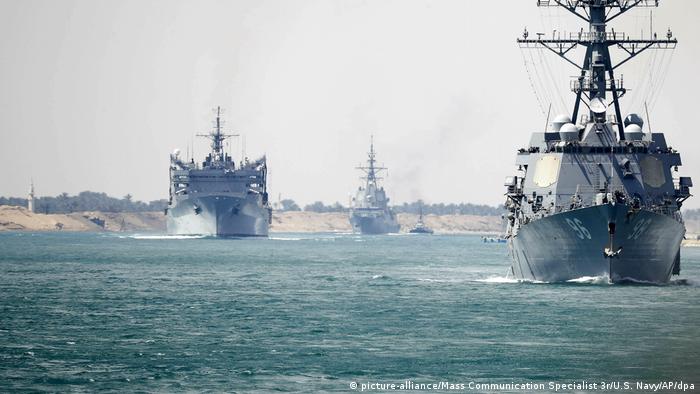The situation in the Gulf is coming to a head after the attack on two tankers in the Gulf of Oman. To the explosiveness of the Situation, several conflicts in the Region. A look at the major players.
In the international waters between the United Arab Emirates and Iran, two cargo ships to be attacked. As a “clear threat to world peace” evaluates the US-American Secretary of state Mike Pompeo this attack in the Gulf of Oman. Pompeo named to the his estimation, those who are responsible for the Iran. However, the day after the attack, it is not clear how it came to the attack on Thursday and who is responsible. The incident alarmed the international community, even the UN security Council has come together. Directly or indirectly, some of the countries in the Region in the various conflicts:
Iran
Iran is currently the world’s front lines. Currently, there is currently a dispute with the United States. In April, the United States sent the aircraft carrier USS Abraham Lincoln in the direction of the Gulf region – some say that the use of the Abraham Lincoln long had long been planned. Others say the White house use scheduled operations to a Statement to make. Foreign Minister Pompeo justified the step with “escalating activities of the Iranians,” without, however, to clarify what he meant. Iran sees itself through the deployment of the aircraft carrier threatened, especially since the US has sent another warship and a Patriot System in the Region. Since then, the United States withdrew under President Trump unilaterial from the international nuclear agreement with Iran, increased tensions between the two countries. The USA occupies Iran with massive economic sanctions.
At the same time, Iran is already for a long time in the conflict with Saudi Arabia. The two States, the struggle for the supremacy in the Region. The rift ranges from the different interests in Syria, Tehran supports Assad, Riyadh, the opposition forces – on the different attitude to Israel, But also to almost four years of continued strength in Yemen.

On the way in the direction of Golf: escort ships of the aircraft carrier USS Abraham Lincoln in the Suez canal, may 2019
He was “convinced” the Iranians for the attack on the two ships, said middle East expert Guido Steinberg of the Berlin Foundation “science and politics” in an interview with DW. This conclusion suggested the circumstances of the attack. “In addition, the fact that the Iranians want to show the USA that they can attack the Oil trade in the Persian Gulf and the Strait of Hormuz match. But at the same time, you don’t attack directly. So I think there are clear signs that the Iranians are responsible for it.” Iran would be responsible for the attack, then the message would be clear: An attack would affect large parts of the global petroleum economy. The Iranian foreign Minister, Mohammad Javad Zarif referred to, however, conjecture that his country was behind the attacks as “groundless”. Iran is likely to have a military confrontation with the United States has no interest, says the security expert Markus Kaim of the Berlin Foundation “science and politics”: “Iran is militarily hopeless under. I can’t see that he had an interest in cars of a military escalation with the United States.”
The United States
US President, Donald Trump is not convinced that the nuclear deal with Iran has had the desired effect. The agreement was “disastrous”, he tweeted in may 2018. Repeatedly, he denounced alleged violations of the Iranian government against the agreement. Trump takes the position that Iran would by the possession of nuclear weapons is unassailable and, accordingly, aggressively in the Region would occur.
This concern also the two closest U.S. allies in the Region, Saudi Arabia and Israel share. These are the United States, in close friendship to the side. In addition, the USA are interested in – like all the other States on secure transports for the oil trade. The Gulf of Oman is in the eye of a needle. Through him, all of the ships happen to have loaded the petroleum on the East coast of the Arabian Peninsula. This is the way to secure the United States. However, Trump does not want a further escalation in the Gulf. The had also explained the Japanese Premier Shinzo Abe, during his visit to Tehran.
Abe’s presence, says security expert Markus Kaim in the ARD-show “issues of the day”, was “an expression of the enormous international concern about the already achieved and further potential escalation in the Region. I would want to read that here we see forces at work that want to undermine these efforts to de-escalate.”
Watch the Video 01:46
Attacks on tankers
Saudi Arabia
The Kingdom provides in front of the Iranian Expansion. The enmity between Iran and Saudi Arabia is not only established on a confessional conflict. It is also a question of political supremacy in the Middle East. In Riyadh, it is observed, like its influence on Iran part of the military – such as in Syria or in Yemen, part of a diplomatic – as in Iraq – to expand. To counter this, has forged the new strong man in Saudi Arabia, crown Prince Mohammed bin Salman, almost four years ago, an international coalition. These fights since then, in Yemen, the militants of the Houthi, which in turn are supported by Iran. However, the war is this war reduces the since the murder of the Dissident Jamal Khashoggi in October in the Saudi Consulate in Istanbul already tarnished reputation of the Kingdom. In this respect, Saudi Arabia has an interest in the conflict not to escalate.
Israel
Israel has for several years been an extremely tense relations with Iran. This has used the war in Syria, to install there a military festival. The Iranian-backed Hezbollah has penetrated up to the Golan heights, the Iranian revolutionary guards hold, meanwhile, a safety distance of approximately 100 kilometers to the Israeli borders. Repeatedly, the Israeli air force had flown attacks on Iranian positions in Syria.

Security: Israeli military in the Golan heights, March 2019
“Iran makes Syria a new Front against Israel, a springboard to conquer from there to Israel,” declared Israeli Minister of justice, Ayelet Shaked in April 2018 in an Interview with the Frankfurter Allgemeine Zeitung”. “Israel will not stand idly on the sidelines and watch Iran Syria takes,” she said.
Meanwhile, Saudi Arabia and Israel are working together against the Mullahs in Tehran. Israel also welcomed the step of the United States, the nuclear agreement with the US to get out. Them the Deal had long been a thorn in the eye. They fear that Iran could pursue a nuclear program secretly ahead. According to the Reuters news Agency, the Iranian revolution leader Ayatollah Khamenei had issued in may a Statement on its Website, in which he wrote that the young people would live to see the demise of Israel. Such a threat in front of the eyes, the hopes of Israel, that the USA build a military build-up. “Netanyahu is a politician, and I have no doubt that at least a part of its Iran strategy, the power should serve as backup,” said the Iran expert Ras Zimmt by the Israeli Institute for National Security Studies last week, in an Interview with the magazine “Zenith”. “He can use the theme to present the Israeli society as the only politician who is able to offer Iran the forehead. Nevertheless – and I’m not a Younger Netanyahu’s – I think that he looks at Iran, indeed, as an existential threat to the state of Israel and it is not alone the election campaign to the corresponding statements of the company.”
A war threat?
The prospects of a direct military confrontation between the US and Iran were low, says security expert Markus Kaim. Because both countries had no interest. Not a nearly random escalation was impose, however. “Imagine an Iranian fast boat approaching an American cruiser There is an unwanted exchange of fire escalated and neither side wants to retreat. This should make us wrinkles on the forehead and bustle.”